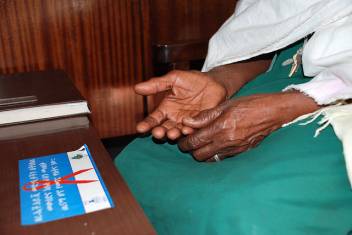 It is becoming increasingly evident that for many people with HIV, physical health is not the only issue. For many people living with the virus; emotional, psychological, social and spiritual – psychosocial – support is extremely important as well.
It is becoming increasingly evident that for many people with HIV, physical health is not the only issue. For many people living with the virus; emotional, psychological, social and spiritual – psychosocial – support is extremely important as well.
Psychosocial support has been a key area of work for HelpAge, particularly regarding programmes we run with older people in Africa providing HIV-related care and support.
And the importance of the topic was underlined last week on 30 October at a meeting on psychosocial support hosted by the UK Consortium on AIDS and International Development.
The event brought together researchers and practitioners to discuss what psychosocial support is and how to effectively provide it in the context of the HIV epidemic.
A series of academics also presented their research and findings.
Depression and distress adversely affects ARV
The clear issue that emerged was the prevalence of depression related to HIV.
Evidence shows depression is the most common mental health challenge for people living with HIV, with research showing rates as high as 63% among people living with HIV in some places.
High rates of depression are also seen in children orphaned as a result of AIDS and those living with a sick carer.
Rates are even higher in children who feel stigmatised and are food insecure. The importance of addressing depression was made clear by evidence showing a link between depression and psychological distress and poor adherence to antiretroviral therapy (ARV).
Words emerging from the day’s discussion included ‘hope’, ‘wellbeing’ ‘acceptance’, ‘being seen and heard’, ‘peer support’ – all demonstrating how crucial psychosocial support is to people’s quality of life.
We heard a powerful presentation from the personal perspective of Silvia Petretti of Positively UK, on why psychosocial support is important for people living with HIV and the forms in which it can be provided.
Some successful interventions to try and combat depression have been peer support alongside more medical based services.
Don’t forget the carers
International HIV/AIDS Alliance later talked about improving the psychosocial wellbeing of caregivers, bringing an important reminder of the contribution caregivers are making to the HIV response and their need for services and support.
In 2010 and 2011 we worked with the Regional Psychosocial Support Initiative (REPSSI) in east and southern Africa to develop two sets of guidelines on psychosocial support for older carers of orphaned and vulnerable children.
One focused on programming and the other on policy.
The guidelines address issues like the wellbeing of older carers and how to provide them with psychosocial support.
They also give advice on building appropriate social support systems, building supportive relationships between older carers and the children they care for and supporting older carers through the grief process.
What next?
Watch our video to see how HIV affects older women
Find out more about the UK Consortium psychosocial support event
